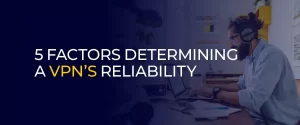

Get 93% OFF on Lifetime
Exclusive Deal
Don’t miss out this deal, it comes with Password Manager FREE of cost.
Get 93% off on FastestVPN and avail PassHulk Password Manager FREE
Get This Deal Now!By Janne Smith No Comments 5 minutes
The undeniable decline of internet freedom in recent years has led many individuals to turn to VPNs to protect their privacy. What was once primarily used by businesses for remote access is now an essential tool for everyday users who want to keep their online activities private and secure.

With increasing concerns about data breaches, surveillance, and geo-restrictions, a VPN is the best way to stay anonymous and safeguard personal information online. But with so many options available, how can you be sure you’re choosing a VPN you can trust?
Beyond flashy marketing and attractive features, several key factors are crucial in determining whether a VPN truly meets the highest standards of security, performance, and reliability.
This applies to any activity requiring a proper and secure internet connection – even if it’s something as random as playing casino free spins on card registration. Actually, it’s even more crucial, because when disclosing your sensitive information, you’re more vulnerable and prone to hackers and fraudsters trying to get hold of your data.
Whether it’s accessing services while traveling or keeping your online activity private, VPNs have become essential for anyone wanting to stay safe online. Let’s take a look at the 5 key factors you must consider to ensure you can trust your VPN service provider.
Note: Despite how accessible the Internet may seem, cyber threats are still there. While you’re only a step away from a potential cyber attack, we recommend connecting to a reliable VPN, like the FastestVPN for enhanced digital protection.
First and foremost, one of the key factors in determining whether a VPN service provider can be trusted is the security protocols they use. These protocols dictate how your data is transmitted between your device and the VPN server, impacting both your security and connection speed.
OpenVPN is one of the most reliable protocols, offering a strong balance between robust security and solid performance. Being open-source, its code is available for public review and improvement by the community, which adds an extra layer of trust.
When you use a VPN, it’s meant to keep your online activity private by routing your data through its secure servers. However, without DNS Leak Protection, there’s a risk that your DNS requests—essentially the web addresses you’re looking up—could bypass the VPN and be sent directly to your internet service provider (ISP). This can expose your browsing history and compromise your privacy.
DNS Leak Protection ensures that all your DNS requests are routed through the VPN server, not your ISP. This means that even if there’s a hiccup in the VPN connection or other technical issues, your DNS requests won’t be leaked outside of the VPN. This feature keeps your online activities hidden from prying eyes and ensures that your privacy remains intact.
Encryption is like a digital lock that protects your data from being accessed by unauthorized parties. When you use a VPN, it encrypts your internet traffic by routing the data through an encrypted tunnel. This means that even if someone intercepts your data—whether it’s a hacker, your Internet Service Provider (ISP), or even government agencies—they won’t be able to decipher it.
A VPN that uses advanced encryption, like the Advanced Encryption Standard (AES) with 256-bit keys (often referred to as AES-256), offers top-notch security. AES-256 is the same level of encryption used by governments and cybersecurity experts around the world, making it the gold standard in data protection.
It’s highly effective at keeping your data safe and ensuring that your personal information and online activities are shielded from prying eyes.
When evaluating the trustworthiness of a VPN service, a strict no-logs policy is a crucial factor. This policy means that the VPN provider does not keep any records of your online activities.
Why is this so important? Simply put, if a VPN service logs your data, there’s a potential risk that your browsing history, IP address, or other sensitive information could be exposed or handed over to third parties, which undermines your privacy and anonymity.
A kill switch is a crucial feature in a VPN service because it protects your privacy and security if your VPN connection unexpectedly drops. Without a kill switch, if your VPN disconnects for any reason, your device will revert to your regular internet connection, exposing your real IP address and potentially sensitive data to your ISP or other third parties.
With various options available, finding a reliable VPN can be a hassle. However, our above-mentioned 5 key factors help you filter out the best options that ensure elevated digital protection. Moreover, the black hats primarily aim to steal data for monetary gains. And that’s where connecting to a VPN, like FastestVPN, becomes essential.
Take Control of Your Privacy Today! Unblock websites, access streaming platforms, and bypass ISP monitoring.
Get FastestVPN
© Copyright 2025 Fastest VPN - All Rights Reserved.


Don’t miss out this deal, it comes with Password Manager FREE of cost.
This website uses cookies so that we can provide you with the best user experience possible. Cookie information is stored in your browser and performs functions such as recognising you when you return to our website and helping our team to understand which sections of the website you find most interesting and useful.
Strictly Necessary Cookie should be enabled at all times so that we can save your preferences for cookie settings.
If you disable this cookie, we will not be able to save your preferences. This means that every time you visit this website you will need to enable or disable cookies again.